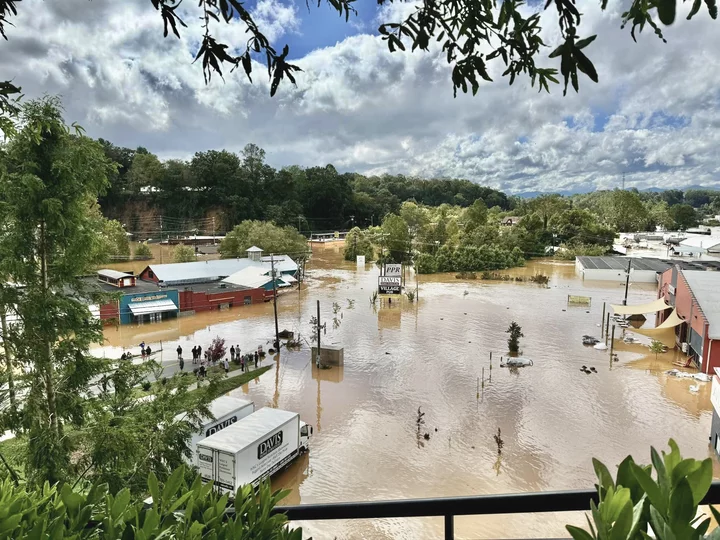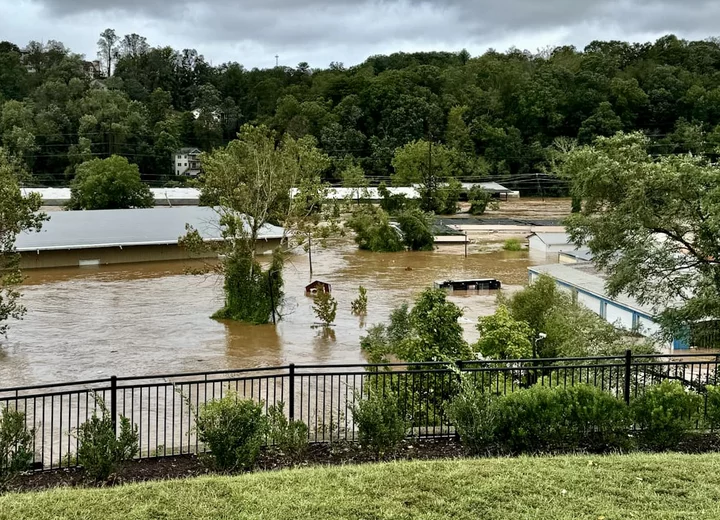Photo: Melissa Rose Frei
I’d like to mention first that I write this coming from a place of privilege, as my husband, dog and myself are safe, and our home was spared from the destruction of Hurricane Helene. My business is also not damaged, but because Western North Carolina is mostly out of power, and there is no running water for potentially months, I am out of work indefinitely. Officials have said even when the water is turned back on, the water is so contaminated we may not be able to shower or drink it. There were many factories that were washed away by the rushing waters, including a plastics manufacturer, so the mud that is leftover in towns and buildings is full of chemicals.
It’s hard to explain this catastrophic situation to my fellow Humboldt folks, or anyone who doesn’t live in the South East. My whole family lives in Eureka, and most of my best friends as well, so I’ll try to use examples I gave them. Imagine you live up on Humboldt Hill, up Fickle Hill, or Kneeland. You come down the hill into town and all you see is brown rushing water and the roofs of buildings. Eureka is gone. Arcata is gone. Then you learn Blue Lake, Willow Creek, Fortuna, and Ferndale have also been wiped out. I’ve lived in Asheville, NC for 8 years now, and one of the many reasons I fell in love with it is because it reminds me of Humboldt. We are full of locally owned businesses, art galleries, breweries, really special restaurants and shops. Surrounded by forests and hiking trails. A lot of Asheville and the surrounding towns have areas just like Old Town or the Arcata Plaza, and they are now rubble. I heard one business owner say in 2004 when we had a bad flood, the water came up to the steps of her business, this time it was up to the ceiling.
But Asheville is not coastal, we are at 2,100 feet elevation in the Blue Ridge Mountains. Hundreds of miles away from the ocean. We are not known to be affected by hurricanes, nor do we get other natural disasters like forest fires, earthquakes, or tornados. This was all extremely unexpected and we were not properly told how to prepare like how Florida would be during a hurricane. Parts of North Carolina got up to 30 inches of rain dumped on us in a matter of days, even before the hurricane actually hit us. Since we are a hilly and mountainous terrain, the water funneled into our valleys and rivers and streams. Many of our rivers run right through town, including The French Broad and Swannanoa River. Once these started to overflow, the water began to rush into neighborhoods within minutes.
When we woke up Friday, Sept. 27, we were without power and our phones were not working. Our neighborhood had downed trees and power lines but again, we are up on a hill away from the water so we just thought we had had a bad wind storm. Historic Biltmore Village is at the bottom of our neighborhood, once we walked down there we realized what was really going on. I could only see the roofs of my favorite vintage stores, a food truck we frequent was floating away alongside a semi truck and propane tanks, our friend’s apartment building was surrounded by rushing water up to the second floor with people stuck on their balconies. A group of us stood by the water’s edge and heard someone yelling “help” over and over and we couldn’t tell where it was coming from.
One of the author’s favorite food trucks, 900 Degreez Pizza, floats through Asheville
The scene I’m describing happened all over Asheville, but also our surrounding towns in Appalachia like Marshall, Black Mountain, Hot Springs, and Burnsville to name a few. Wonderful, vibrant, community-driven places that literally look like they got bombed. One of our major highways heading out of town collapsed. Many roads have washed away that lead to rural areas so emergency vehicles cannot get there. We have pack mules bringing in supplies and incredible humans hiking to check on missing people. Thats the amazing thing we are all witnessing is the community coming together to save each other, it’s so hopeful during this deeply devastating time. And I can say I’m actually thankful for social media right now, everyone is sharing information via Instagram, including our city officials. Now that there is limited internet in some places, there are Instagram posts and stories daily updating town supply needs, drinking water and medic tent locations, what fire department has wifi, how to apply for disaster relief unemployment, missing persons, etc. It’s how my friends have been able to tell each other “I’M SAFE!” when our phones didn’t work for days. Through all the suffering Asheville is very lucky to have some of these resources, but many more people in surrounding areas are stuck out in nooks and crannies, with zero contact, waiting to be rescued.
I really appreciate you for reading this. We are all desperate for more outreach. I don’t think the rest of the country is really understanding the severity, this is the second worst hurricane in the nation’s history after Katrina. If you are able to donate, here are some local grassroots organizations that have been on the ground absolutely killing it since day one:
BeLoved Asheville
Venmo: @BeLoved-Asheville
Paypal: BeLovedAsheville
Cashapp: $BeLovedAsheville
Mountain Mule Packers
Venmo: @mountainmulepackers
Asheville Survival
Venmo: @AppMedSolid
(Asheville is spelled with two e’s, avoid scammers!)


CLICK TO MANAGE